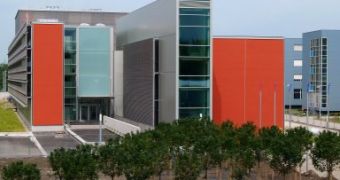Since many of the world's top supercomputers are powered by Intel's Xeon server processor, it should come as no surprise that the chip manufacturer's interest in this particular field of extreme computing is quite high, its latest endeavor being a collaboration with IBM for the development of "SuperMUC", a next generation supercomputer to be installed at Leibniz Supercomputing Centre (Leibniz-Rechenzentrum LRZ) of the Bavarian Academy of Sciences and the Humanities. SuperMUC will be the successor to the "HLRB II" system which has been in operation since 2006 and it is intended to take a leading position amid the world's top supercomputers when it starts operation in mid 2012, especially since it features 3 PetaFlop/s peak performance, 320 TeraBytes of main memory and 12 PetaBytes of permanent storage.
SuperMUC will be comprised of more than 110,000 processor cores, delivered by the aforementioned Intel Xeon processors, and will feature a revolutionary new cooling concept, the active components, like processors and memory, being directly cooled with water that can have a temperature of up to forty degrees Celsius.
This "High Temperature Liquid Cooling" and very innovative system software enable a very moderate increase in the consumed energy, and, in addition, all LRZ buildings will be heated using this energy.
LRZ's supercomputers are used for research in all fields of science like simulation of the evolution of the universe under the influence of dark matter, modeling the earth's interior, propagation of earthquakes, computing the dynamical properties of miscellaneous systems from engineering and nature, down to biological systems and medical scenarios.
The investment costs for SuperMUC, including operational costs and power for 5 to 6 years, are 83 million Euros, provided jointly by the State of Bavaria and Germany, as are the additional 50 million Euros for the extension of LRZ's buildings.
"With the new supercomputer, the German and European research community is getting a push to be on the forefront of international competition," said Martin Jetter, chairman of the board, IBM Germany, when talking about the brand-new Intel-powered supercomputer.

 14 DAY TRIAL //
14 DAY TRIAL //